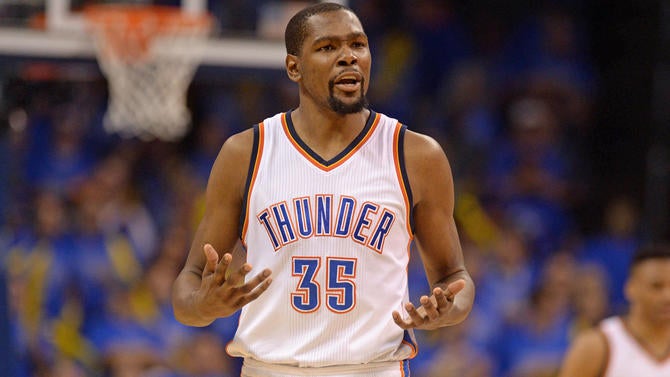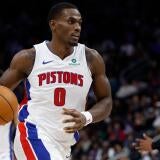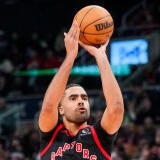Locked into another battle with Warriors, OKC can't afford to lose Durant Derby
The offseason salary cap spike gets the Warriors a seat at the table as the league's biggest free agent prize decides among the Thunder, Warriors and Celtics.

The Kevin Durant Derby, which has reached last-two-minute report territory, began in earnest last summer. At Team USA camp in Las Vegas last August, CBS Sports asked Durant and other NBA stars what frustrated them most about today's media and social media landscape.
Durant started down a certain road -- "Uh, just, I think we should ..." -- before realizing this was not a road he should be traversing.
"You know what?" Durant said. "I'm not even going to answer that."
And then Durant offered an explanation/cheat sheet for how to interpret and handicap the impending Summer of Durant, which has now reached its final hours.
"Along with Matty Ice [Thunder PR man Matt Tumbleson], I've got two people that I trust with my life: my agent and my manager, who's my best friend as well," Durant said. "I trust them with my life. So if you hear sources or anything, don't believe it if it didn't come from them. I tell them everything. We bounce ideas off each other. We collaborate on a lot of different things. They give me advice. So throughout this year, if you hear sources from anybody, it's not true, unless you hear it from Charlie Bell, Rich Kleiman or Kevin Durant."
Sound advice, as we try to parse and interpret the various tentacles of the KD grapevine.
The one thing everyone agrees on is that Durant's decision is likely to come down Monday, along with the rest of the fireworks on the Fourth of July. Beyond that, all bets are off until Durant himself and/or someone in his tight circle of trust comes forth with an answer.
It was a two-team race between the Warriors and Thunder late Sunday -- until it wasn't anymore, with a report from Comcast SportsNet New England that the Celtics were still very much in the mix. The Clippers and Heat have been widely dismissed, yet not publicly by the only people who matter: Durant; his agent, Kleiman of Roc Nation Sports; and Bell, his manager and longtime friend.
So, we wait. And ponder the stakes -- and the storylines.
If it's the Celtics, it would represent Durant spurning Oklahoma City for the team that Thunder GM Sam Presti grew up in New England admiring. The championship culture and tradition that blossomed in Boston during Presti's youth is the kind of environment that could appeal to Durant -- not to mention the agreement with free agent Al Horford, which helped legitimize Boston's rebuilding effort.
If Durant's goal were to play with Horford, though, he could have done so in Oklahoma City. The Thunder had explored several scenarios by which they could have cleared enough cap room to bring Horford to a team that has been to four of the last six Western Conference finals. As flush as the Celtics are with assets and draft picks, they're not anywhere close to the championship-ready product that the Thunder are.
But the real dichotomy exists between the Thunder and their on- and off-court nemesis, the Golden State Warriors. Here we have two teams that only weeks ago famously dueled for seven games in the Western Conference finals -- with the defending champs improbably climbing out of a 3-1 hole and denying Durant a trip to the NBA Finals.
Game 8 of that series is coming down the stretch, and the stakes couldn't be higher for either side.
Especially, though, for the Thunder.
According to SportsLine's predictive analytics, the Thunder go from a 58-win team next season to a 46-win team without Durant -- yet, they drop only one spot in the West, from third to fourth. As for the Warriors, they go from a projected 63-win team to a 70-win team with Durant. Their odds of winning the championship go from 37 percent to 55 percent.
None of this takes into account the roster moves that would have to take place to make room for Durant; Golden State would have to renounce all of its free agents, lose restricted free agent Harrison Barnes and trade Andrew Bogut. But you get the point; Durant going from OKC to the Bay Area makes the Thunder a lot worse and the Warriors a lot better.
But it would do much more than that. We've already explained the reasons behind the landmark contracts being doled out in the first two days of free agency due to the spike in the salary cap -- from $70 million last season to just north of $94 million this coming season. It's easy to dismiss the spike as an anomaly whose greatest harm is to disproportionately reward a few dozen players who happened to be free agents at the right time.
Durant leaving Oklahoma City for a team that just had a record 73-win season and fell one win shy of repeating as NBA champions -- a team that already has three All-Stars including the two-time reigning MVP -- would represent a seismic consequence of some pretty bad planning.
The whole point of the restrictions and bottlenecks inserted into the collective bargaining agreement after a costly five-month lockout in 2011 was to prevent stars from clustering in big, glamorous markets. Owners in the majority of NBA cities that are neither big nor glamorous were rocked to their cores by the Heat's coup in teaming LeBron James, Dwyane Wade and Chris Bosh in Miami in 2010. And they burned through 20 percent of the NBA season and $800 million to make sure it would never happen again.
And for a few years, it was working. Contracts were shorter and more reasonable. With the exception of Mikhail Prokhorov's Nets, the number of luxury tax-paying teams -- and the amount of their tax payments -- were on the decline.
Then came the Great Cap Spike of 2016, and it rendered the NBA's salary cap and luxury tax system -- the closest thing to a hard cap that the league has ever had -- completely impotent.
And it got the Warriors an audience with Durant -- an audience they never would've had without the spike. With some tinkering around the edges of the roster, the Warriors will be poised to do what the 2011 CBA had gone to great lengths to prevent.
In its various iterations over the years, the NBA free-agent system was designed to give a big advantage to the home team. Any team trying to lure a superstar free agent would have to gut its roster through salary-dumping trades in order to be in the game.
With the spike flooding the system with $1 billion in cap room this summer, the Warriors gained admission to the Durant sweepstakes only weeks after dismissing the Thunder in Game 7 of the Western Conference finals.
Game 8 is deep in the fourth quarter now, with much more than Durant's immediate future at stake.
If Durant leaves OKC for the Bay Area, the Thunder's reward for intelligently managing their roster -- amassing five recent lottery picks under 25 years old in their rotation despite winning the second-most wins to the Spurs over the past seven seasons -- would be losing a transformational franchise player to a much bigger and more glamorous market.
As Durant has stated, nobody except Durant himself, his agent and close adviser knows if that will happen. But if it does, the NBA will no longer be able to dismiss the 2016 salary cap spike as a harmless blip on the radar of basketball commerce.
It will become the crowning example of exactly that the league was trying to prevent.
The fireworks will be short-lived, but the consequences could last for a decade.


















